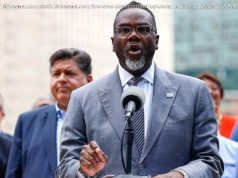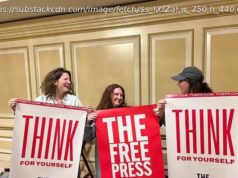Jamie Metzl writes that Trump’s terrible performance in Helsinki and Singapore constitutes a fundamental threat to American national security.
By first raising the level of bellicosity between the United States and North Korea to dangerous heights and strengthening sanctions, Trump seemed to be pressuring Pyongyang to make concessions in exchange for better relations. But just when the pressure on North Korea was greatest, he traded years of hard work by multiple administrations to build this pressure for a feel-good meeting and photo-op with Kim.
The agreement Trump signed with Kim gave the North Koreans almost everything they wanted while requiring them to give up very little in return. If North Korea-US relations were a card game, the North Koreans, just like Putin and the Russians, used their few weak cards to defeat Trump’s far stronger hand.
But don’t just take my word for it. The easiest way to assess who came out ahead is to line up the gains and losses of the relevant parties.
Like Putin, Kim got almost everything he wanted. As a start, the meeting itself provided a legitimation of North Korea’s leadership that Kim’s father and grandfather had craved but never achieved. The head of a regime that has starved and executed its people in a manner the United Nations has labeled a » crime against humanity » sat as an equal with a leader of a country that once stopped Nazism, won the Cold War and led the world in fostering the ideas of human rights, democracy and international law. Without ever saying they intended to give up their nuclear weapons, the North Koreans got Trump to announce that North Korea was «no longer a nuclear threat,» that the «maximum pressure» campaign was over and, most recently, that «there is no rush» to resolve the North Korea nuclear crisis.
By making the snap decision to suspend previously sacrosanct US military exercises with South Korea, Trump weakened US and South Korean military readiness and sent a message to America’s allies that US security guarantees could be flippantly negotiated away.
In exchange for all of these benefits, the North Koreans promised to return some remains of US soldiers from the Korean War (which did not happen right away, in spite of Trump’s announcement it would) and expressed the same commitment to take steps toward the «denuclearization of the Korean peninsula» that North Korean leaders have been offering for decades. No credible observers believe the North Koreans committed themselves to giving up their nuclear weapons with this language. Not only have no significant steps been made toward denuclearization since the Singapore agreement, but North Korea has apparently increased its production of nuclear fuel and expanded an important ballistic missile manufacturing site.
For the United States, on the other hand, the long list of outcomes fills the «loss» column. The United States has lost much of the minimal leverage sanctions once provided now that China, Korea’s dominant trading partner and aid provider, is easing up enforcement. In addition, by caving to Kim so completely and easily, Trump sent a message to other countries thinking of developing nuclear weapons that the nuclear nonproliferation treaties would not be meaningfully enforced. By impulsively suspending military exercises, Trump in one fell swoop undermined US and South Korean military readiness, instilled fear among America’s allies that US security guarantees might not be enforced, and strengthened China, which had for decades sought a suspension of US military exercises in its neighborhood. Even the South Korean liberals supportive of greater reconciliation between the United States and South Korea were taken aback by Trump granting Kim the suspension of military exercises that had for so long been off the table.
On the «gain» side, it’s hard to get too excited about a freeze in nuclear and missile tests now that North Korea already has a basic but minimally deliverable nuclear weapon and no longer needs these tests as much as before. North Korea also returned three hostages they never should have taken in the first place, a repeat of previous hostage releases to past administrations.
But US strategic interests are far from the only losers in this shameful process. The North Korean people, who are suffering terribly under the horrific oppression of the Kim regime, were thrown under the proverbial bus by the country that had previously been among their greatest champions. America’s steadfast Japanese allies watched powerlessly as Trump barely mentioned the Japanese citizens abducted by North Korea in the 1970s and 1980s and still held in North Korea, and the abductees issue was not included in the Trump-Kim agreement. Japan also watched in shock as the Trump administration explored the possibility of reductions of North Korea’s long-range missiles that could conceivably leave Japan vulnerable to North Korean nukes even if the US mainland was not.
Despite this lopsided outcome, US Secretary of State Mike Pompeo is still peddling the fantastical delusion that we are on a path toward North Korea giving up its nuclear weapons. After National Security Adviser John Bolton mentioned that North Korea could get rid of its nukes within a year, he was quickly reined in by Trump and changed his tune. Trump’s fantasy of imagined progress has replaced America’s strategic goal of containing North Korean aggression and protecting US allies.
Bringing the fantasy of North Korean denuclearization and his bizarre infatuation with Vladimir Putin together, Trump tweeted on July 18 that Putin and the Russians would «help with North Korea.» With no coherent opposition in their way, the North Koreans will almost certainly retain their nuclear weapons.
But even if they do, it’s obviously better to have more peaceful relations with North Korea than more bellicose ones. Acquiescing to North Korea’s nuclear ambitions, however, will ultimately come at a further cost. When Republican presidential primary challengers likely announce themselves next year, they will almost certainly start accusing Trump of foreign policy malpractice that has legitimated North Korea’s nuclear arsenal. Having done nothing to stem North Korea’s nuclear weapons program, Trump will then be pressured to escalate tensions with North Korea even more haphazardly and dangerously than before.






